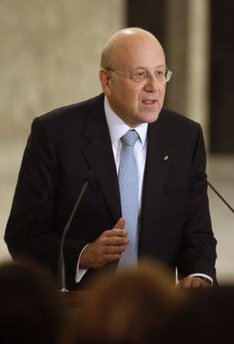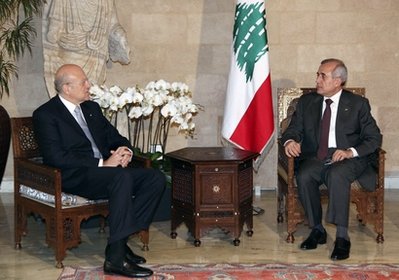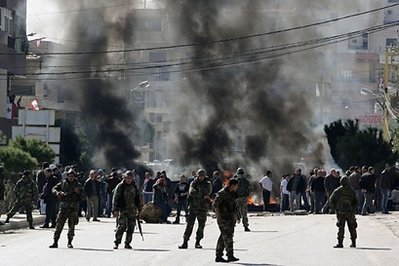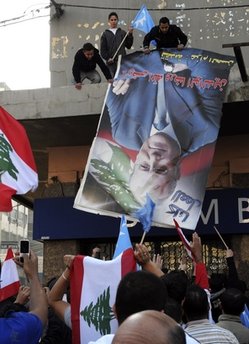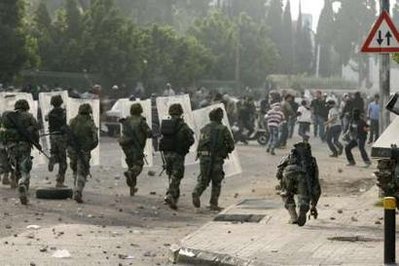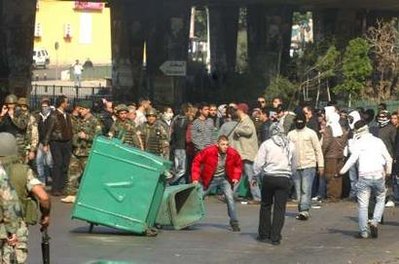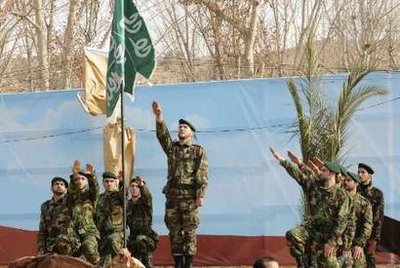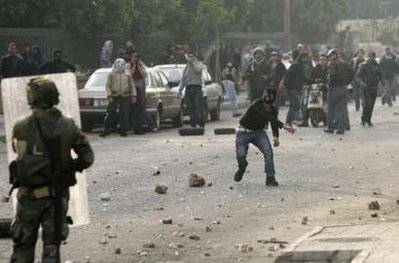PM Najib Mikati won 68 votes out of the parliament’s 128 seats to achieve the required parliamentary majority he needed to become Lebanon’s new prime minister. President Michel Suleiman asked the billionaire Sunni tycoon to form a government amid a "day of rage" by fellow Sunnis who blocked roads and burned tyres in anger at his nomination, Mikati shortly after his appointment rejected attempts to cast him as "Hezbollah’s man" and said he would cooperate with all Lebanese in a bid to form an inclusive government. "Don’t prejudge me or my behaviour, please, especially the international community," the 55-year-old billionaire businessman told AFP in an interview at his Beirut home where well-wishers gathered to congratulate him.
"I say in all honesty that my nomination by Hezbollah does not mean I am bound by any of their political positions, except as concerns the protection of the national resistance," he said, referring to the Shiite militant group’s struggle against neighbouring Israel. "I will cooperate fully with all Lebanese to form a new government that protects their unity and sovereignty," he said. "My hand is extended to all Lebanese."
Mikati told AFP that he would seek to address the thorny issue through dialogue. "Stopping the tribunal today is no longer a Lebanese decision," he said, adding that Lebanon’s cooperation with the tribunal was another question altogether.
The win came two days after the discussions held between lawmakers and Sleiman and almost two weeks after the collapse of Hariri’s cabinet due to resignation of 11 opposition ministers. The collective resignation was in protest at a potential move by the US-backed Special Tribunal for Lebanon (STL) to issue an indictment against Hezbollah.
Protests had turned violent in the northern Sunni bastion of Tripoli, where frenzied demonstrators torched an Al-Jazeera van and ransacked offices of a local Sunni lawmaker who backed Mikati. Mikati’s appointment has angered Sunnis who see it as a bid by the Iran- and Syria-backed Hezbollah to sideline outgoing premier Saad Hariri and impose its will in Lebanon. Lebanese Armed Forces on Friday deployed its troops in all regions of the country, in a bid to maintain security amid the crisis raised by a UN-backed probing of former Prime Minister Rafic Hariri’s murder case. In a statement issued Friday, The Lebanese Army Guidance Directorate said that within the context of preserving peace and calm throughout the country, the army will adopt security measures such as setting mobile and fixed military checkpoints and regular patrol in different region.
Please click read more for more detail and more Pictures of these unfortunate events – We just want peace and democracy:
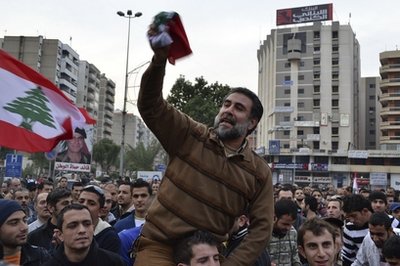
A supporter of Lebanese caretaker Prime Minister Saad Hariri shouts slogans during a protest in the northern port city of Tripoli, Lebanon
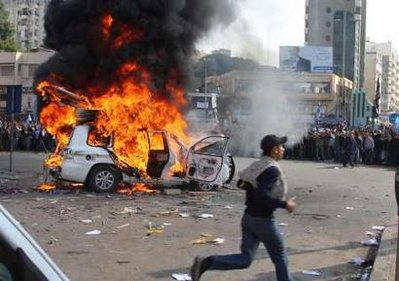
A man runs past a satellite truck used by Al Jazeera TV channel that was set on fire by Lebanese Sunni Muslim supporters of Lebanon’sPM Saad Hariri
Speaking on a televised speech addressing people in the Lebanese city of Baalbek on Tuesday, Hezbollah Secretary General Seyyed Hassan Nasrallah rejected claims that the Prime Minister designate Najib Mikati was Hezbollah’s pick for the post.
Nasrallah criticized certain political leaders from the rival camp for making efforts to mislead the public opinion in Lebanon and to falsify the truth.
BEIRUT (Reuters) – Qatar and Turkey suspended talks on Thursday over Lebanon’s political crisis, saying it was time for Lebanese themselves to tackle a dispute over an indictment into the 2005 killing of Sunni statesman Rafik al-Hariri.
Turkish Foreign Minister Ahmet Davutoglu, speaking after two days of talks in Beirut with Lebanon’s political leaders, said he and Qatari Prime Minister Sheikh Hamad bin Jassim al-Thani had failed to win agreement for their proposals.
He spoke a day after Saudi Arabia, which backs caretaker Prime Minister Saad al-Hariri — son of the slain leader — said it was abandoning mediation efforts with rival Syria, deepening uncertainty in a country where solutions are usually hammered out between regional powers.
"We presented a draft to all sides that included their demands and was based on the Syrian-Saudi Arabian initiative," Davutoglu said, referring to earlier efforts by Damascus and Riyadh to contain tensions in Lebanon over the indictment.
"The final decision lies with Lebanese groups… This morning we saw from the reactions and responses made to us that there were still some reservations," he told reporters in Istanbul after leaving Beirut shortly before dawn.
"However, if they take a new approach, we are always ready to show effort for Lebanon’s stability. But rather than a new effort from us, it’s time for the sides to think."
Hezbollah and its allies brought down the government last week, five days before a prosecutor in U.N.-backed tribunal issued a confidential draft indictment which is expected to accuse members of Shi’ite group Hezbollah.
The group denies any role in the assassination and says the tribunal is serving U.S. and Israeli interests.
Hezbollah, which is backed by Syria and Iran, and its ministerial allies resigned from the cabinet after Hariri, who has Western and Saudi support, refused their demands to cut Lebanon’s links with the tribunal.
Despite the Qatari and Turkish efforts, Iran and Saudi Arabia are the most influential regional players in Lebanon and no breakthrough could take place without their consent.
COST OF CRISIS
The political confrontation in Lebanon, which suffered 15 years of civil war from 1975-1990, revived fears of more recent violence in May 2008, when gunmen took over parts of Beirut in response to government moves against Hezbollah.
Caretaker Finance Minister Raya Hassan warned this week that prolonged political tension would hurt the economy, and the cost of insuring Lebanon’s debt against restructuring or default rose 5 basis points to an 18-month high of 350 points, Markit said.
The Blom index of Lebanese stocks fell 0.7 percent to 1,465 points, nearly six percent down on an intra-day high of January 11, the day before Hariri’s government collapsed. But it was still above levels in October and November last year.
Consultations to form a new government were postponed for a week on Monday to give regional powers a chance to bring the two sides closer together. But Michel Aoun, a Christian leader allied to Hezbollah, reiterated opposition to Hariri being nominated to lead a new government.
"We have said Hariri should not come back, and yes he should not come back," Aoun said. In Lebanon’s power sharing political system, the prime minister must be Sunni Muslim, the president Maronite Christian, and the parliamentary speaker a Shi’ite.
Lebanese officials had held out little hope that this week’s Qatari-Turkish talks would lead to instant results.
Sheikh Hamad and Davutoglu held separate talks with Lebanese leaders, including a four-hour meeting with Hariri and a late night meeting with Hezbollah leader Sayyed Hassan Nasrallah, who has lived in hiding since 2006 for fear of assassination.
By Antonin GREGOIRE
Lebanon’s "vertical cooperation" with STL
What happens if Lebanon do not agree with the Tribunal
The cooperation between STL and Lebanon is said to be a “vertical model” as described in the STL 1st annual report:
This “vertical model” is divided into two possible sub-models.
The 1st one says that states have to implement by their own means the decisions or acts decided by the international tribunal. According to this model, the local authorities have to “implement investigative or judicial acts of assistance to the requesting international tribunal or court through their own prosecutorial or judicial authorities – if need be, in the presence of officials of the international tribunal or court.”
The second model of vertical cooperation is more intrusive: “States authorise once and for all an international tribunal or court to carry out investigative or judicial acts of assistance on their territory without the assistance of their own authorities – except for those acts which, by their nature, require the active cooperation or protection of local enforcement agents, such as searches, execution of arrest warrants.”
The model applying to Lebanon is a mix between the two. The government of Lebanon signed a cooperation agreement which is attached to the UN resolution 1757 creating the STL. The prosecution can carry its investigations without the assistance or the consent of the local authorities.
The Article 4(1) of the Statute provides that “within its jurisdiction, the Tribunal shall [also] have primacy over the national courts of Lebanon”.
This means that even if Lebanon decides to carry on its own investigations and trial over Hariri’s murder, the STL will still continue its procedures without taking into consideration the Lebanese procedures.
If Lebanon refuses to cooperate, the UN security council may apply sanctions
In case of non compliance to an STL demand, a mechanism of three steps is prepared. This mechanism is compulsory.
“First, the President would consult with the relevant Lebanese authorities with a view to inducing them to cooperate.
"Second, in the event of a persistent refusal to cooperate, the Pre-Trial Judge or the Trial Chamber would make a judicial finding of non-cooperation.
"Third, the President would report this judicial finding to the Security Council for appropriate action."
It is more likely that the UN security council will not try to apply force to Lebanon. The consequences of an international force intervening in Lebanon to force the authorities to cooperate would result in an open disaster for the Middle East. Therefore, it is more likely that the UN security council will apply, if needed, economic sanctions against Lebanon as they did with Iran.
The most frightening prospect would be to see the prosecutor asking the pre-trial judge to issue such warrants to preliminary detain suspects. The prosecutor has this power if he proves that there is a chance that the suspects may conduct new terrorist attacks or try to prevent the STL from operating properly. In that case, it will be up to the Lebanese authorities to arrest the suspects and, if they refuse, the UNSC can apply sanctions against Lebanon.
However, the STL will probably not issue such warrants for two reasons. First, Daniel Bellemare and the pre-trial judge Fransen are aware of the consequences such warrants would have on Lebanon.
Second, such procedures enter in direct conflict with the presumption of innocence that the STL has to respect in the sake of its own legitimacy. The presumption of innocence implies that any accused has the right to stand freely before the judges.
Cooperation with other States
Another disposition can change the hostility against the STL and may drive Lebanon into cooperating even if the opposition runs the government.
Collaboration with STL is compulsory to Lebanon but free for other states. The defence office or the prosecutor can ask other states to sign cooperation agreements. For instance, the defense office can ask Syria to give documents that could help the defense of the accused. It is then up to Syria to decide whether they collaborate with the tribunal or not. If they refuse, the defense could lose a valuable document and the chances of the accused to be found guilty may increase. If they accept, both the defense and prosecution may require Syria’s assistance and Syria will be considered as having recognised and cooperated with the STL.
The same case can apply to any country and this disposition will probably result in many surprises:
The US officially agreed to collaborate with the prosecutor but in a recent document revealed by WikiLeaks, the prosecutor Daniel Bellemare was complaining of the lack of cooperation from the US who did not answer his demands.
It is also most likely that the other states are going to be asked for collaboration, either by the prosecutor or by the defence or by both: Syria, Israel, Iran, US, UK etc. The answers from these states will weigh heavily on the STL legitimacy and recognition.
by Rania Badawi:
Syria is working hard to keep Egypt out of the political settlement process in Lebanon after the fall of Lebanon’s Saad Hariri’s government, former President of Lebanon Amine Gemayel said in an interview with Al-Masry Al-Youm.
Gemayel held Syria responsible for the failure of Syrian-Saudi mediation efforts to resolve the disagreements between Lebanon’s opposition and government over the international tribunal probing the assassination of former Prime Minister Rafik Hariri.
Gemayel said Syria is biased in favor of the opposition since Syria shares interests with Lebanon’s opposition.
He also said armed confrontations in Lebanon will likely follow the withdrawal of Hezbollah’s government members and the subsequent collapse of the government, adding that the deployment of Hezbollah’s soldiers on 18 January sent a clear message to the people to either choose Hezbollah’s nominee or else risk wide-scale destruction in the country.
By Abigail Fielding-Smith
FT.com’s
n recent years, Lebanon has been eating, drinking, sunbathing and luxury apartment-building its way to annual economic growth rates of 8 per cent.
The country’s growth has been driven primarily by domestic consumption, which is sensitive to the political atmosphere. According to research by Byblos Bank, consumer confidence has dropped almost every month since the latest political tensions began in July.
“The 8 per cent growth in 2010 was mostly the result of construction activity and tourism, which are not necessarily economic sectors with a great sustainability record,” says Marcus Marktanner, an economics professor at the American University of Beirut. “If the crisis escalates, the same two industries have also the potential to deflate the economy again.”
Although there is limited evidence so far, a slowdown in the real economy is widely expected. Following the government’s collapse, the Institute of International Finance revised down its growth predictions for this year from 7 per cent to 4 per cent.
The Lebanese monetary and financial systems are famously resilient and optimists say this makes it likely the economy will bounce back, as it did after the assassination of Rafiq Hariri (the former prime minister and father of Saad) in 2005, the war with Israel in 2006 and the internal armed clashes of 2008.
Lebanon’s financial institutions have evolved to withstand short-term political turbulence well. The Central Bank’s foreign currency holdings, just more than $30bn, are some of the highest on a per-capita basis in the world, which has enabled it to meet the increased demand for dollars.
“The Lebanese pound is stable,” Raya Hassan, the caretaker finance minister, said last week. “We went through tougher crises before and there is not one time where we did not fulfil our obligations. We have resiliency to confront such crises.”
But if the crisis persists, Lebanon’s financial sector could face trouble. Although bankers say there are no signs of capital flight, rating agency Moody’s pronounces it a “significant risk”.
Moreover, the agency says a growth slowdown combined with market uncertainties could hurt the banks, even in the absence of a sharp or prolonged flight of capital.
“The stability of the financial and economic system has been based on the strong growth in deposit inflows; so a reversal of this trend or the outflow of deposits, although highly unlikely at this stage, has always been the key risk for the system in the absence of reforms to reduce the government’s borrowing needs,” says Nassib Ghobril, head of research at Byblos Bank.
Although the banks have comfortable liquidity buffers, capital flight would put pressure on their ability to refinance government debt – of which $3.5bn in eurobonds is due to mature this year – at current interest rates.
Lebanon’s government owes more than $50bn, much of which is held by domestic banks. In spite of the prosperity and stability of recent years, the government has failed to decrease the debt in nominal terms, but points out that it has succeeded in reducing at as proportion of gross domestic product. Riad Salameh, the central bank governor, warned last week that if the crisis continued, it would have a “negative impact” on the debt-to-GDP ratio.
The Associated Press
Date: Tuesday Jan. 25, 2011 1:21 PM ET
WASHINGTON — The Obama administration warned Lebanon’s political leaders on Monday that continuing U.S. support for their country will be difficult if the militant Hezbollah movement takes a dominant role in government.
The makeup of the Lebanese government is Lebanon’s decision, the State Department said. But the larger the role for Hezbollah, the "more problematic" for relations with Washington, State Department spokesman P.J. Crowley said.
Crowley would not say what the United States would do should Hezbollah’s candidate become prime minister and be able to form a government, but he said it would be hard to carry on business as usual if that should happen.
Asked whether the U.S. would be able to continue economic support for a Hezbollah-controlled government in Lebanon, he replied, "That would be difficult for the United States to do."
